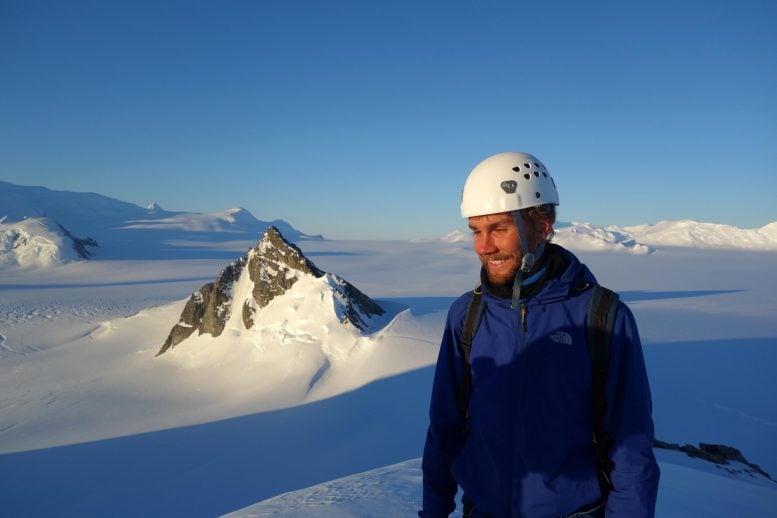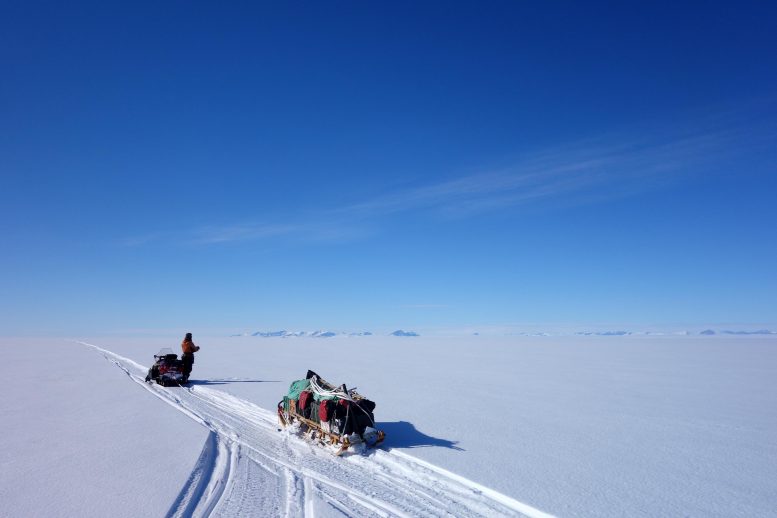
Researchers have confirmed for the first time that Pine Island Glacier in West Antarctica could cross tipping points, leading to a rapid and irreversible retreat which would have significant consequences for global sea level.
Pine Island Glacier is a region of fast-flowing ice draining an area of West Antarctica approximately two-thirds the size of the UK. The glacier is a particular cause for concern as it is losing more ice than any other glacier in Antarctica.
Currently, Pine Island Glacier together with its neighboring Thwaites Glacier are responsible for about 10% of the ongoing increase in global sea level.
Scientists have argued for some time that this region of Antarctica could reach a tipping point and undergo an irreversible retreat from which it could not recover. Such a retreat, once started, could lead to the collapse of the entire West Antarctic Ice Sheet, which contains enough ice to raise the global sea level by over three meters (10 feet).
While the general possibility of such a tipping point within ice sheets has been raised before, showing that Pine Island Glacier has the potential to enter unstable retreat is a very different question.
Now, researchers from Northumbria University have shown, for the first time, that this is indeed the case.
Their findings are published in the leading journal, The Cryosphere.

Using a state-of-the-art ice flow model developed by Northumbria’s glaciology research group, the team have developed methods that allow tipping points within ice sheets to be identified.
For Pine Island Glacier, their study shows that the glacier has at least three distinct tipping points. The third and final event, triggered by ocean temperatures increasing by 1.2C (2.2F), leads to an irreversible retreat of the entire glacier.
The researchers say that long-term warming and shoaling trends in Circumpolar Deep Water, in combination with changing wind patterns in the Amundsen Sea, could expose Pine Island Glacier’s ice shelf to warmer waters for longer periods of time, making temperature changes of this magnitude increasingly likely.
The lead author of the study, Dr. Sebastian Rosier, is a Vice-Chancellor’s Research Fellow in Northumbria’s Department of Geography and Environmental Sciences. He specializes in the modeling processes controlling ice flow in Antarctica with the goal of understanding how the continent will contribute to future sea level rise.
Dr. Rosier is a member of the University’s glaciology research group, led by Professor Hilmar Gudmundsson, which is currently working on a major £4 million study to investigate if climate change will drive the Antarctic Ice Sheet towards a tipping point.
Dr. Rosier explained: “The potential for this region to cross a tipping point has been raised in the past, but our study is the first to confirm that Pine Island Glacier does indeed cross these critical thresholds.
“Many different computer simulations around the world are attempting to quantify how a changing climate could affect the West Antarctic Ice Sheet but identifying whether a period of retreat in these models is a tipping point is challenging.
“However, it is a crucial question and the methodology we use in this new study makes it much easier to identify potential future tipping points.”
Hilmar Gudmundsson, Professor of Glaciology and Extreme Environments worked with Dr Rosier on the study. He added: “The possibility of Pine Island Glacier entering an unstable retreat has been raised before but this is the first time that this possibility is rigorously established and quantified.
“This is a major forward step in our understanding of the dynamics of this area and I’m thrilled that we have now been able to finally provide firm answers to this important question.
“But the findings of this study also concern me. Should the glacier enter unstable irreversible retreat, the impact on sea level could be measured in meters, and as this study shows, once the retreat starts it might be impossible to halt it.”
Reference: “The tipping points and early warning indicators for Pine Island Glacier, West Antarctica” by Sebastian H. R. Rosier, Ronja Reese, Jonathan F. Donges, Jan De Rydt, G. Hilmar Gudmundsson and Ricarda Winkelmann, 25 March 2021, The Cryosphere.
DOI: 10.5194/tc-15-1501-2021
Northumbria is fast becoming the UK’s leading university for research into Antarctic and extreme environments. As well as the £4m tipping points study, known as TiPPACCs, Northumbria is also the only UK university to play a part in two projects in the £20m International Thwaites Glacier Collaboration – the largest joint project undertaken by the UK and USA in Antarctica for more than 70 years. Northumbria is leading the PROPHET and GHC projects within the Thwaites study. This particular study was funded through both TiPPACCs and PROPHET.
6 Comments
The whole concept of a “Tipping Point,” with irreversible consequences, is a misnomer. As used, is based on an unstated assumption that the current climate is either unstable or in a metastable state. If it were possible for any environmental process to transition rapidly to a stable state from which it could not recover, it would already have happened after 4.5 billion years, and we would be stuck in that state today.
It is possible to have extreme transient states, such as an “Ice House,” or a “Hot House.” However, even an area as vast as the Sahara Desert was verdant not all that long ago, and is showing signs of retreat at its margins, thanks to increasing CO2.
“Tipping Point” is just another of the phrases promoted by alarmists, such as “ocean acidification,” and “Sixth Mass Extinction,” intended to scare people and have them react emotionally, rather than objectively consider the evidence.
I personally take offense at other people trying to manipulate me!
“Could” is a classic weasel word that only denotes a possibility. It is like saying “I could win the Publishers Clearing House lottery.” I wouldn’t advise anyone to give up their day job based on the claim “could win.” In any case, rather than using the ambiguous word “could,” they should assign a numeric probability to their prophesy, along with an uncertainty range. Fortune tellers use words like “could;” scientists use numbers.
These people promised results when they were given this grant. They will be held responsible to do just that. In favor of the money. In favor of the paradigm. Now when the Gulf Stream fails and we enter the next scheduled Ice Age they will have to find something else to cry wolf over. These people need to make a living too. Lets just not give their research too much credit.
“The third and final event, triggered by ocean temperatures increasing by 1.2C, leads to an irreversible retreat of the entire glacier.”
The 20th century global sea surface temperature (SST) has increased about 0.7 deg C. At current rates, it will take almost 200 years for the global average to increase by 1.2 deg C, assuming things continue as they have. However, it appears that there has been a recent slight downturn in the global average. And, the critical concern is what is happening in the Antarctic ocean. West Antarctica appears to be cooling for the last couple of decades. The melting in the East Antarctic glaciers seems to be the result of geothermal heating in an area sitting astride the Pacific Ring of Fire. A lot can happen in 200 years! The situation warrants monitoring. However, none of us around today will be present to witness their worst-case scenario, should it happen.
“Climate change” alarmism needs to be stoped, scientists have been talking of the irreversible and devastating changes that will happen for decades, where are they?
Climate change is a natural process, its not man made, man is only contributing to the trend of warming, it’s a matter of when not if.
Science on this field is very political and corrupt, all variables that contribute to temperature and climate change are not being considered, good counter arguments are being ignored.
In science the objective is not trying to prove a theory is right, its trying to prove it wrong, remember that.
All of this alarmism is being used to seize control of people by governments and corporations, look at the agenda for 2030 and 2050. It’s unreal the changes that “they” are pushing, this is the real threat.
It seems that some people don’t know the difference between “confirmation” and “supporting evidence.”
https://notrickszone.com/2021/05/01/debunked-new-computer-simulated-pine-island-glacier-doomsday-paper-by-rosier-et-al-ignores-lots-of-science/